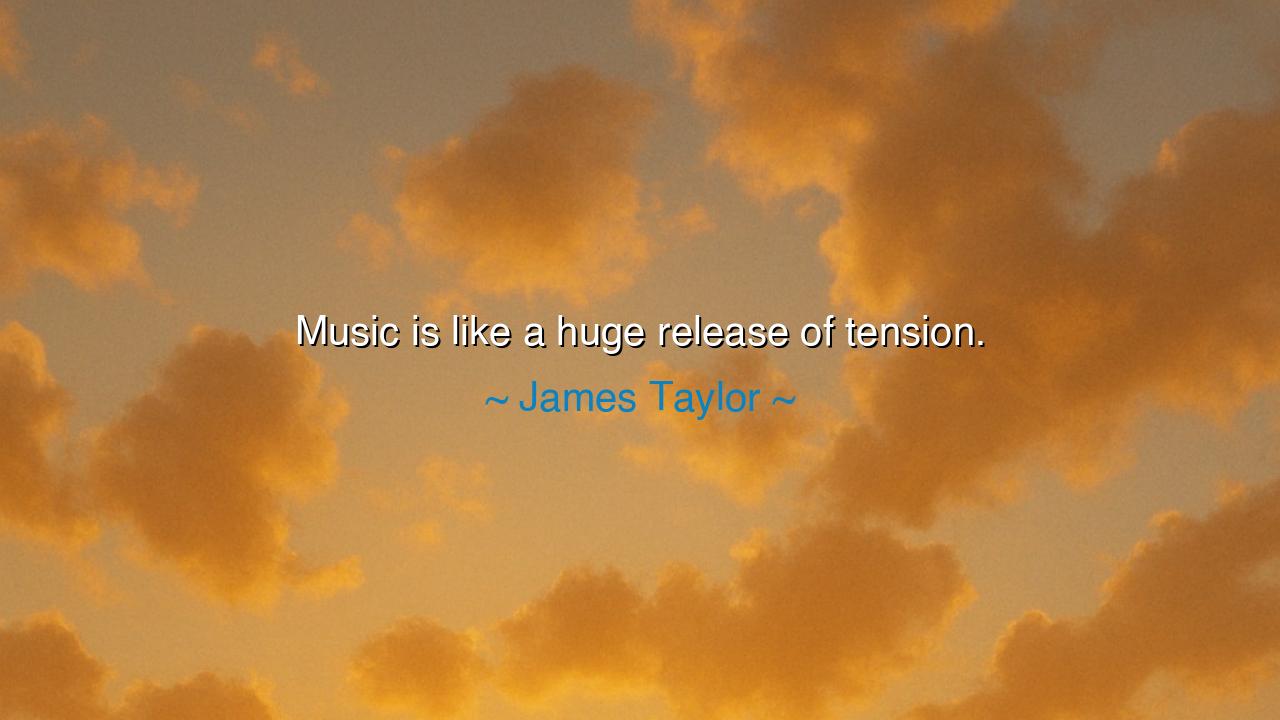
Music is like a huge release of tension.






The words of James Taylor resound with simplicity and depth: “Music is like a huge release of tension.” In these words we find not only the comfort of song but the eternal role of music in the healing of the human spirit. For life, since the dawn of time, has been filled with weight: the burdens of labor, the grief of loss, the storms of the heart. And in every age, humanity has turned to melody as one turns to a wellspring in the desert. Music breaks chains the tongue cannot undo, and in its flow, the soul finds release.
The ancients knew this truth well. The Greeks spoke of the modes of music, each capable of stirring courage, soothing sorrow, or calming wrath. Pythagoras himself taught that harmony was not only of strings but of the soul and cosmos, a divine order that could bring balance to those burdened by disquiet. Thus, when Taylor says music is a “release of tension,” he speaks with the voice of those ancient sages who saw melody as medicine and rhythm as rest.
Consider the tale of King Saul in the Hebrew scriptures. Tormented by a troubled spirit, he found no peace in his throne, his power, or his riches. Yet when young David came and played his harp, the heaviness lifted. The music poured over the king like a balm, and his anguish eased. What no counsel, no riches, no armies could heal, music alone could soothe. Here lies the eternal truth: when the heart is bound tight in sorrow or stress, music unknots it with unseen hands.
So too across history, music has served as a release for whole peoples. The enslaved Africans in America sang spirituals in the fields, lifting their souls beyond the cruelty of their chains. Their voices rose not as a denial of suffering but as a triumph over it, turning pain into song, tension into strength. Out of these cries of resilience were born blues, gospel, and jazz—forms of music that have since healed and inspired countless souls across the world. Their release became a gift not only for themselves but for generations yet unborn.
James Taylor himself, through his own struggles, embodied this truth. Battling addiction and despair, he turned again and again to music. His songs, gentle and heartfelt, carried the weight of his struggles, but in releasing them through melody, he found healing. And those who listened found healing too, as though his release became theirs. In this, we see the sacred reciprocity of art: the musician releases his tension through song, and the listener, hearing it, feels their own burden lightened.
The lesson, O seeker, is clear: do not keep your tensions locked in silence, for silence makes them heavier. Instead, let them flow into song, into words, into rhythm. You need not be a master, for the act of singing, humming, or playing is itself a form of freedom. To engage in music is to grant your heart a path of escape, and to remind yourself that no weight is eternal. The melody will rise, the rhythm will move, and in their wake, your soul will breathe.
Practical action follows: when tension coils within you, seek music. Play an instrument if you can, sing aloud even if your voice trembles, or listen deeply to songs that move your spirit. Do not treat music as mere background noise, but as a sacred ritual—an intentional release, a way of loosening what the world has bound. Approach it with reverence, and it will return to you peace.
Thus remember: music is not only entertainment, but liberation. It is the door through which the soul escapes its cage, the breath that softens the weight of existence. James Taylor spoke a truth as old as humanity itself: when life presses hard upon you, let music carry the burden, and you will find release. For in song lies not only sound, but salvation.






AAdministratorAdministrator
Welcome, honored guests. Please leave a comment, we will respond soon